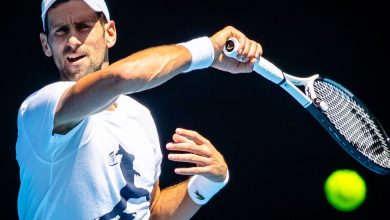To Skate for the Dutch, You First Must Beat the Matrix

When the speedskater Dai Dai N’tab finished second in the 500-meter men’s race during the Netherlands’ Olympic qualifying event in December, he thought he had secured one of the three Olympic entries at that distance.
Yet when the Royal Dutch Skating Federation didn’t name N’tab to its Olympic team in early January, he was left to tell a local newspaper, “Of course I am angry, at everything and everyone.”
N’tab wasn’t the only one left ruing the federation’s decisions. Patrick Roest will skate in three events at the Olympics, but he complained that Marcel Bosker was chosen for the 1,500 meters even though Bosker had finished behind him at the distance.
Roest said he did not understand the federation’s choices, but that hardly made him an outlier: Hardly anybody understands how some decisions are reached at the Olympisch Kwalificatietoernooi, an always volatile mix of perhaps the most competitive Olympic qualifying event in the world and a byzantine selection procedure known as the matrix.
“It’s quite hard to explain how it works,” Ireen Wust, the most decorated Dutch skater in history, said before embarking on a nearly unfathomable minute-long explanation of the selection process that ended with: “So it’s really complicated.”
Led by Roest, Thomas Krol, Irene Schouten and Wust, the Netherlands will almost certainly leave Beijing with the most speedskating medals, as its team has at every Olympics since the 1998 Nagano Games. If that happens, it will be because the Dutch team is forged in a competition that some say makes the pressure of the Olympics feel mild in comparison.
“If you ask even the biggest Olympians in the Netherlands, if you ask them what they found most nerve-racking, it’s not the Olympics themselves but it’s the qualifying race before the Olympics,” said Douwe de Vries, a distance skater who has never qualified for the Olympics.
Te be sure, the Netherlands is not the only country stocked with enough talent in one sport to make team selection uncomfortable. But the Dutch dominance of speedskating, combined with the limited number of Olympic berths in the sport, sometimes makes it feel as if picking its team can be more about mathematics than skating. And the calculating starts long before anyone sets foot on the ice at the trials.
During World Cup races this winter, speedskaters earned spots in Olympic races for their countries through their performances during the season. The Dutch earned the maximum 32 places — 16 starting spots each across the six men’s and women’s individual races. But because of a restriction on the number of athletes who can compete in a given sport at the Olympics, the Dutch were allowed to select only nine men and nine women, meaning most of the country’s skaters will compete in multiple events.
The question for Dutch team officials, then, and for the matrix, was how to allocate 16 spots among nine athletes. Should a strong 500-meter skater like N’tab be selected, even if he is not competitive at other distances? Or should the team choose an athlete who might be competitive across multiple distances? And how big a factor should balance play in team selection, considering that four of the world’s best 1,000-meter skaters are from the Netherlands and would all be considered contenders for a medal only one could claim?
To try to take the emotion out of some of those thorny questions, the Dutch skating federation turned a decade ago to mathematicians at the University of Groningen to help them design a selection procedure that would lead to the most competitive team, and, crucially, put a halt to controversies over the selection.
Or, rather, the University of Groningen turned to them. Gerard Sierksma, an econometrics professor whose work focuses on mathematically optimizing logistical problems, saw the federation’s predicament and emailed the technical director before the 2010 Olympics.
Sierksma thought selection should be based upon past performance. By entering a few years of results into a formula, with recent results weighted the most heavily, he argued, the skaters with the best chance of medaling could be selected.
But Dutch skating officials did not want their team to be selected entirely by algorithm, nor did they care to abandon the Olympisch Kwalificatietoernooi — five days of races that, before the coronavirus, drew capacity crowds of 15,000 to the national speedskating oval in Heerenveen in late December.
Sierksma’s alternative was “de matrix.” A series of calculations was made to rank each of the 16 starting spots according to the likelihood, still based on past results, that the Dutch would win a medal in any given race. Crucially, the calculations are not based on which individual skater was most likely to win, but which races the Dutch collectively had the best chance of medaling in.
In a list made public before the trials, each of the starting spots was ranked from 1 to 15 (the mass start is handled differently, with the participants chosen by the skating federation). Once nine skaters of each gender have qualified based on the matrix, those skaters must be used to fill out the rest of the starting spots, no matter how they fared in the qualifying races.
Because the men performed relatively poorly in the 500 meters this season, the second and third starting spots for the distance were near the bottom of the matrix. Still, at the end of the qualifying tournament, N’tab was the eighth-ranked Dutch skater. If the skating federation had simply taken the top nine male skaters — as it did with the women — N’tab would have qualified for Beijing.
Unfortunately for N’tab, as Sierksma emphasized, the system is not absolute: It also leaves room for human judgment, which Remy de Wit, the skating federation’s technical director, chose to exercise. Neither Bosker nor Sven Kramer performed well enough at the trials to qualify for the Olympics, but their skills were seen as needed in the mass start and team pursuit events, so they were chosen over N’tab and Tijmen Snel, who finished third in the 1,500 meters.
Four years ago, Krol was on the short end of a similar selection conundrum.
In 2018, he finished third in the 1,000 meters, seemingly securing his Olympic spot. But since Kai Verbij had already qualified in the 500 meters but was injured for the 1,000-meter race, the Dutch skating federation gave him Krol’s spot so that he could compete in both in Pyeongchang, South Korea. That choice freed a spot for another skater for the team pursuit.
“So, actually, everybody was happy with it,” Krol said. “‘OK, someone can go for team pursuit, Kai is a good skater in the 1,000 so he can go although he’s injured. And Thomas, yeah, you know, we’re sad for him.’”
Krol, 29, still took part in the Games, but only as a commentator and only grudgingly, at the request of his team’s sponsor. His countryman Kjeld Nuis won the 1,000 meters. Verbij, who had been given Krol’s place, finished sixth.
“Fun fact: Kai’s my best friend,” Krol said, adding, “It was really painful because it was my spot, of course, and I felt like they kind of lacked compassion there.”
Since then, Krol has won Dutch, European and world titles. And in a few days, he will finally get the chance to try to become an Olympic champion.
He won the 1,000 meters and took second in the 1,500 meters at the Dutch qualifiers, and will skate in both of those races in Beijing. He will also skate the 500 meters, a distance he rarely races.
Since N’tab won’t be going to Beijing, the Dutch needed somebody to skate it.





